Entrepreneurship & Small Business Management: A Comprehensive Report
VerifiedAdded on 2021/02/21
|16
|4703
|209
Report
AI Summary
This report delves into the multifaceted world of entrepreneurship and small business management. It begins by defining entrepreneurship and exploring different venture types, including small business, scalable start-ups, large company ventures, and social entrepreneurial ventures. The report als...

Entrepreneurship
&
Small Business
Management
&
Small Business
Management
Paraphrase This Document
Need a fresh take? Get an instant paraphrase of this document with our AI Paraphraser
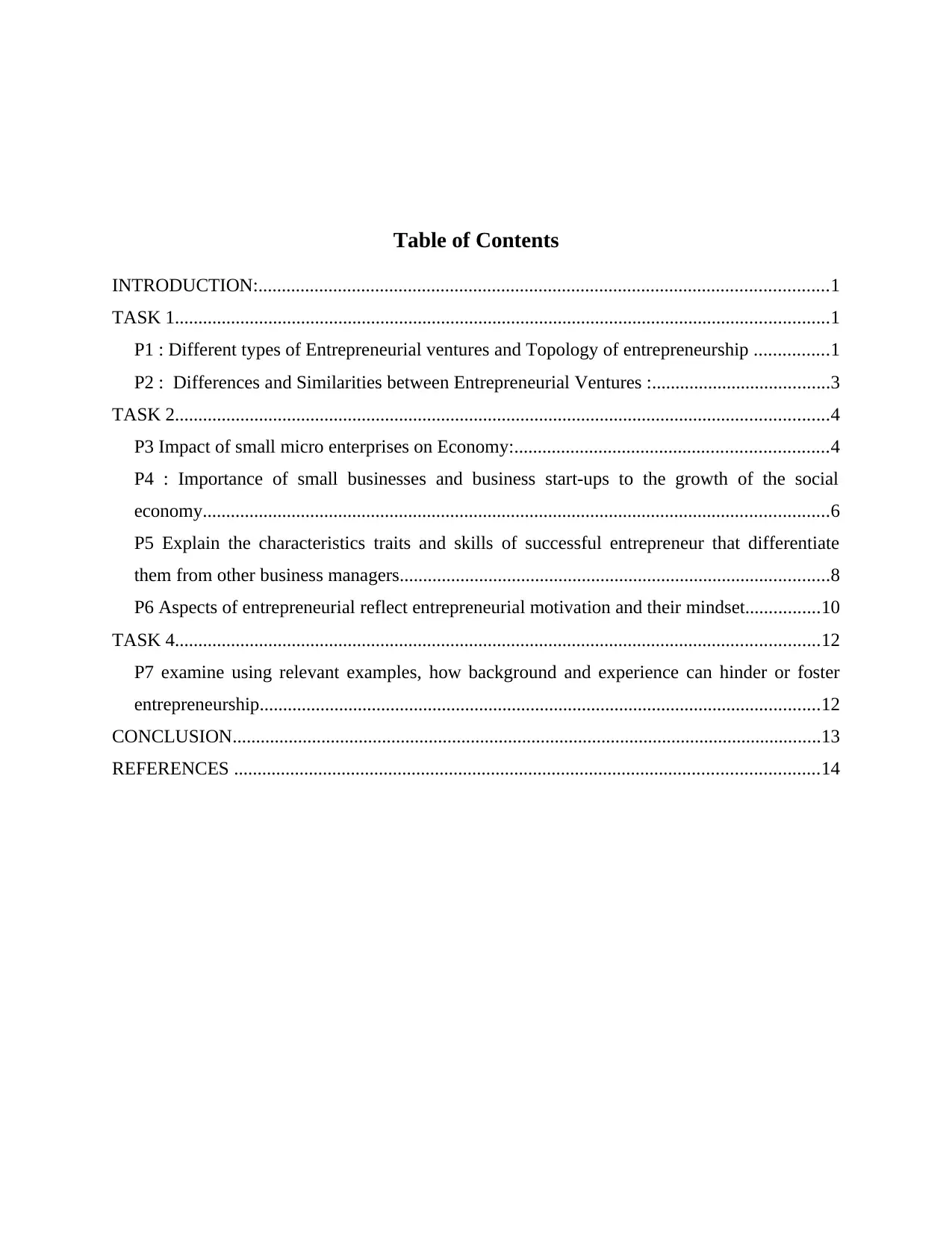
Table of Contents
INTRODUCTION:..........................................................................................................................1
TASK 1............................................................................................................................................1
P1 : Different types of Entrepreneurial ventures and Topology of entrepreneurship ................1
P2 : Differences and Similarities between Entrepreneurial Ventures :......................................3
TASK 2............................................................................................................................................4
P3 Impact of small micro enterprises on Economy:...................................................................4
P4 : Importance of small businesses and business start-ups to the growth of the social
economy......................................................................................................................................6
P5 Explain the characteristics traits and skills of successful entrepreneur that differentiate
them from other business managers............................................................................................8
P6 Aspects of entrepreneurial reflect entrepreneurial motivation and their mindset................10
TASK 4..........................................................................................................................................12
P7 examine using relevant examples, how background and experience can hinder or foster
entrepreneurship........................................................................................................................12
CONCLUSION..............................................................................................................................13
REFERENCES .............................................................................................................................14
INTRODUCTION:..........................................................................................................................1
TASK 1............................................................................................................................................1
P1 : Different types of Entrepreneurial ventures and Topology of entrepreneurship ................1
P2 : Differences and Similarities between Entrepreneurial Ventures :......................................3
TASK 2............................................................................................................................................4
P3 Impact of small micro enterprises on Economy:...................................................................4
P4 : Importance of small businesses and business start-ups to the growth of the social
economy......................................................................................................................................6
P5 Explain the characteristics traits and skills of successful entrepreneur that differentiate
them from other business managers............................................................................................8
P6 Aspects of entrepreneurial reflect entrepreneurial motivation and their mindset................10
TASK 4..........................................................................................................................................12
P7 examine using relevant examples, how background and experience can hinder or foster
entrepreneurship........................................................................................................................12
CONCLUSION..............................................................................................................................13
REFERENCES .............................................................................................................................14
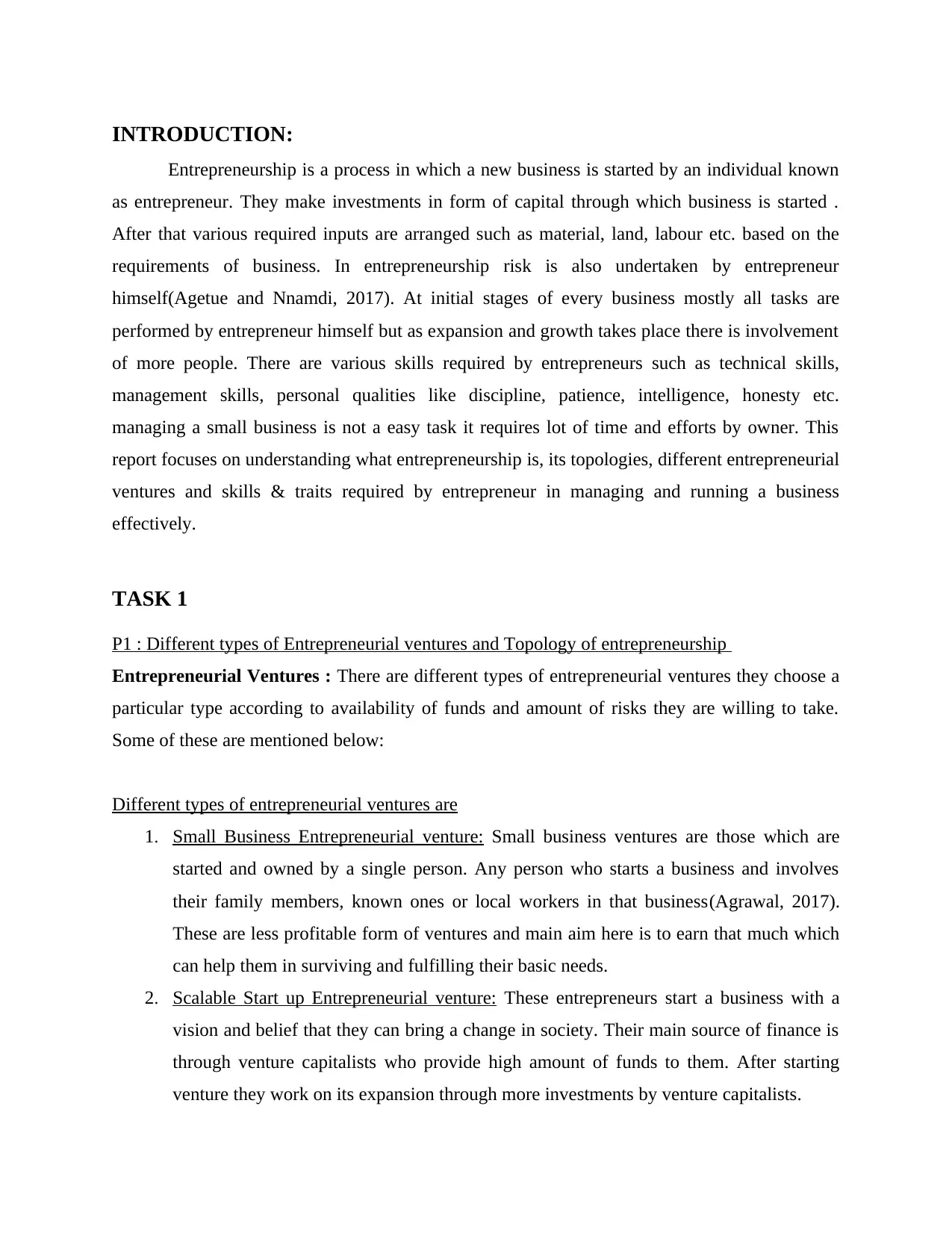
INTRODUCTION:
Entrepreneurship is a process in which a new business is started by an individual known
as entrepreneur. They make investments in form of capital through which business is started .
After that various required inputs are arranged such as material, land, labour etc. based on the
requirements of business. In entrepreneurship risk is also undertaken by entrepreneur
himself(Agetue and Nnamdi, 2017). At initial stages of every business mostly all tasks are
performed by entrepreneur himself but as expansion and growth takes place there is involvement
of more people. There are various skills required by entrepreneurs such as technical skills,
management skills, personal qualities like discipline, patience, intelligence, honesty etc.
managing a small business is not a easy task it requires lot of time and efforts by owner. This
report focuses on understanding what entrepreneurship is, its topologies, different entrepreneurial
ventures and skills & traits required by entrepreneur in managing and running a business
effectively.
TASK 1
P1 : Different types of Entrepreneurial ventures and Topology of entrepreneurship
Entrepreneurial Ventures : There are different types of entrepreneurial ventures they choose a
particular type according to availability of funds and amount of risks they are willing to take.
Some of these are mentioned below:
Different types of entrepreneurial ventures are
1. Small Business Entrepreneurial venture: Small business ventures are those which are
started and owned by a single person. Any person who starts a business and involves
their family members, known ones or local workers in that business(Agrawal, 2017).
These are less profitable form of ventures and main aim here is to earn that much which
can help them in surviving and fulfilling their basic needs.
2. Scalable Start up Entrepreneurial venture: These entrepreneurs start a business with a
vision and belief that they can bring a change in society. Their main source of finance is
through venture capitalists who provide high amount of funds to them. After starting
venture they work on its expansion through more investments by venture capitalists.
Entrepreneurship is a process in which a new business is started by an individual known
as entrepreneur. They make investments in form of capital through which business is started .
After that various required inputs are arranged such as material, land, labour etc. based on the
requirements of business. In entrepreneurship risk is also undertaken by entrepreneur
himself(Agetue and Nnamdi, 2017). At initial stages of every business mostly all tasks are
performed by entrepreneur himself but as expansion and growth takes place there is involvement
of more people. There are various skills required by entrepreneurs such as technical skills,
management skills, personal qualities like discipline, patience, intelligence, honesty etc.
managing a small business is not a easy task it requires lot of time and efforts by owner. This
report focuses on understanding what entrepreneurship is, its topologies, different entrepreneurial
ventures and skills & traits required by entrepreneur in managing and running a business
effectively.
TASK 1
P1 : Different types of Entrepreneurial ventures and Topology of entrepreneurship
Entrepreneurial Ventures : There are different types of entrepreneurial ventures they choose a
particular type according to availability of funds and amount of risks they are willing to take.
Some of these are mentioned below:
Different types of entrepreneurial ventures are
1. Small Business Entrepreneurial venture: Small business ventures are those which are
started and owned by a single person. Any person who starts a business and involves
their family members, known ones or local workers in that business(Agrawal, 2017).
These are less profitable form of ventures and main aim here is to earn that much which
can help them in surviving and fulfilling their basic needs.
2. Scalable Start up Entrepreneurial venture: These entrepreneurs start a business with a
vision and belief that they can bring a change in society. Their main source of finance is
through venture capitalists who provide high amount of funds to them. After starting
venture they work on its expansion through more investments by venture capitalists.
⊘ This is a preview!⊘
Do you want full access?
Subscribe today to unlock all pages.

Trusted by 1+ million students worldwide
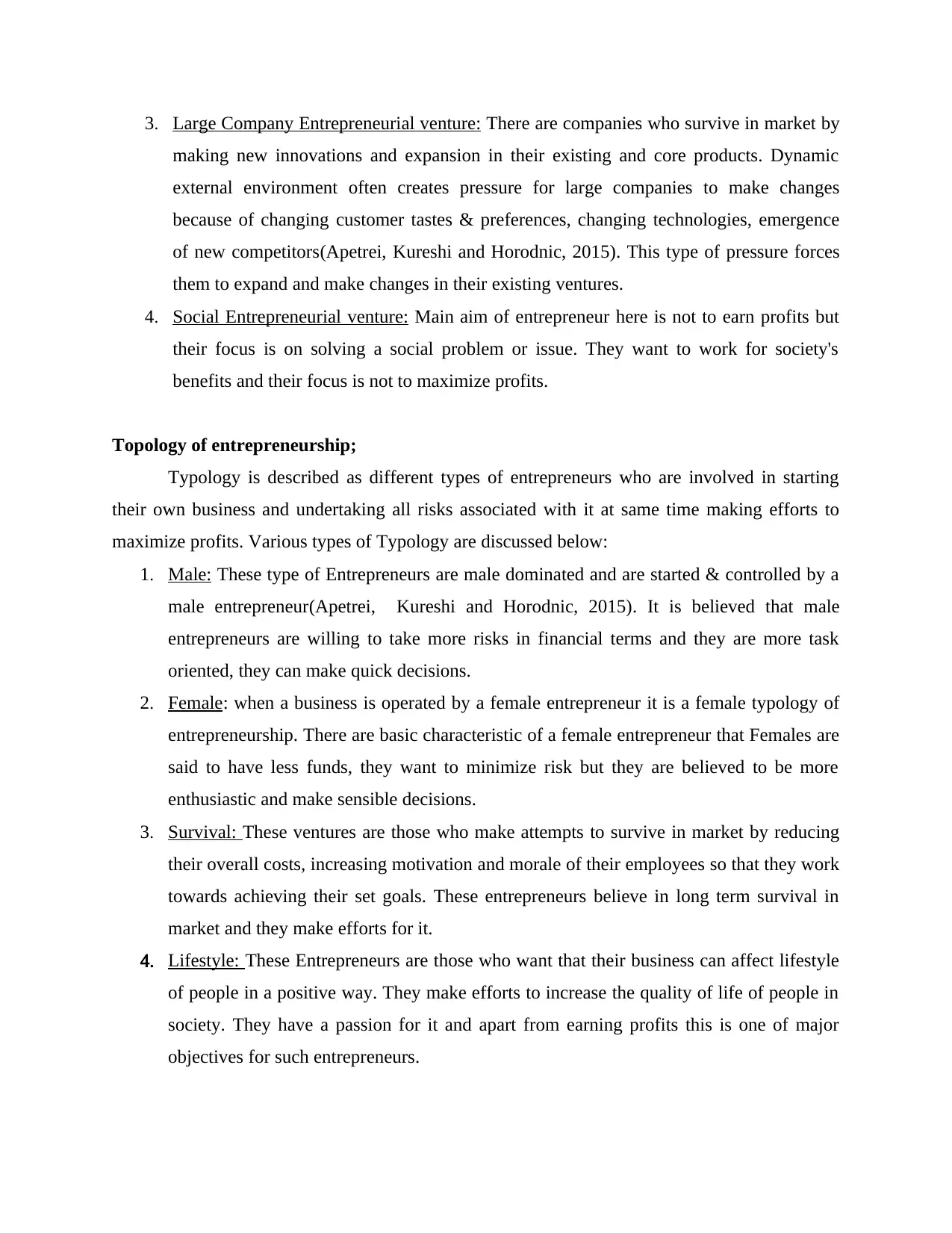
3. Large Company Entrepreneurial venture: There are companies who survive in market by
making new innovations and expansion in their existing and core products. Dynamic
external environment often creates pressure for large companies to make changes
because of changing customer tastes & preferences, changing technologies, emergence
of new competitors(Apetrei, Kureshi and Horodnic, 2015). This type of pressure forces
them to expand and make changes in their existing ventures.
4. Social Entrepreneurial venture: Main aim of entrepreneur here is not to earn profits but
their focus is on solving a social problem or issue. They want to work for society's
benefits and their focus is not to maximize profits.
Topology of entrepreneurship;
Typology is described as different types of entrepreneurs who are involved in starting
their own business and undertaking all risks associated with it at same time making efforts to
maximize profits. Various types of Typology are discussed below:
1. Male: These type of Entrepreneurs are male dominated and are started & controlled by a
male entrepreneur(Apetrei, Kureshi and Horodnic, 2015). It is believed that male
entrepreneurs are willing to take more risks in financial terms and they are more task
oriented, they can make quick decisions.
2. Female: when a business is operated by a female entrepreneur it is a female typology of
entrepreneurship. There are basic characteristic of a female entrepreneur that Females are
said to have less funds, they want to minimize risk but they are believed to be more
enthusiastic and make sensible decisions.
3. Survival: These ventures are those who make attempts to survive in market by reducing
their overall costs, increasing motivation and morale of their employees so that they work
towards achieving their set goals. These entrepreneurs believe in long term survival in
market and they make efforts for it.
4. Lifestyle: These Entrepreneurs are those who want that their business can affect lifestyle
of people in a positive way. They make efforts to increase the quality of life of people in
society. They have a passion for it and apart from earning profits this is one of major
objectives for such entrepreneurs.
making new innovations and expansion in their existing and core products. Dynamic
external environment often creates pressure for large companies to make changes
because of changing customer tastes & preferences, changing technologies, emergence
of new competitors(Apetrei, Kureshi and Horodnic, 2015). This type of pressure forces
them to expand and make changes in their existing ventures.
4. Social Entrepreneurial venture: Main aim of entrepreneur here is not to earn profits but
their focus is on solving a social problem or issue. They want to work for society's
benefits and their focus is not to maximize profits.
Topology of entrepreneurship;
Typology is described as different types of entrepreneurs who are involved in starting
their own business and undertaking all risks associated with it at same time making efforts to
maximize profits. Various types of Typology are discussed below:
1. Male: These type of Entrepreneurs are male dominated and are started & controlled by a
male entrepreneur(Apetrei, Kureshi and Horodnic, 2015). It is believed that male
entrepreneurs are willing to take more risks in financial terms and they are more task
oriented, they can make quick decisions.
2. Female: when a business is operated by a female entrepreneur it is a female typology of
entrepreneurship. There are basic characteristic of a female entrepreneur that Females are
said to have less funds, they want to minimize risk but they are believed to be more
enthusiastic and make sensible decisions.
3. Survival: These ventures are those who make attempts to survive in market by reducing
their overall costs, increasing motivation and morale of their employees so that they work
towards achieving their set goals. These entrepreneurs believe in long term survival in
market and they make efforts for it.
4. Lifestyle: These Entrepreneurs are those who want that their business can affect lifestyle
of people in a positive way. They make efforts to increase the quality of life of people in
society. They have a passion for it and apart from earning profits this is one of major
objectives for such entrepreneurs.
Paraphrase This Document
Need a fresh take? Get an instant paraphrase of this document with our AI Paraphraser
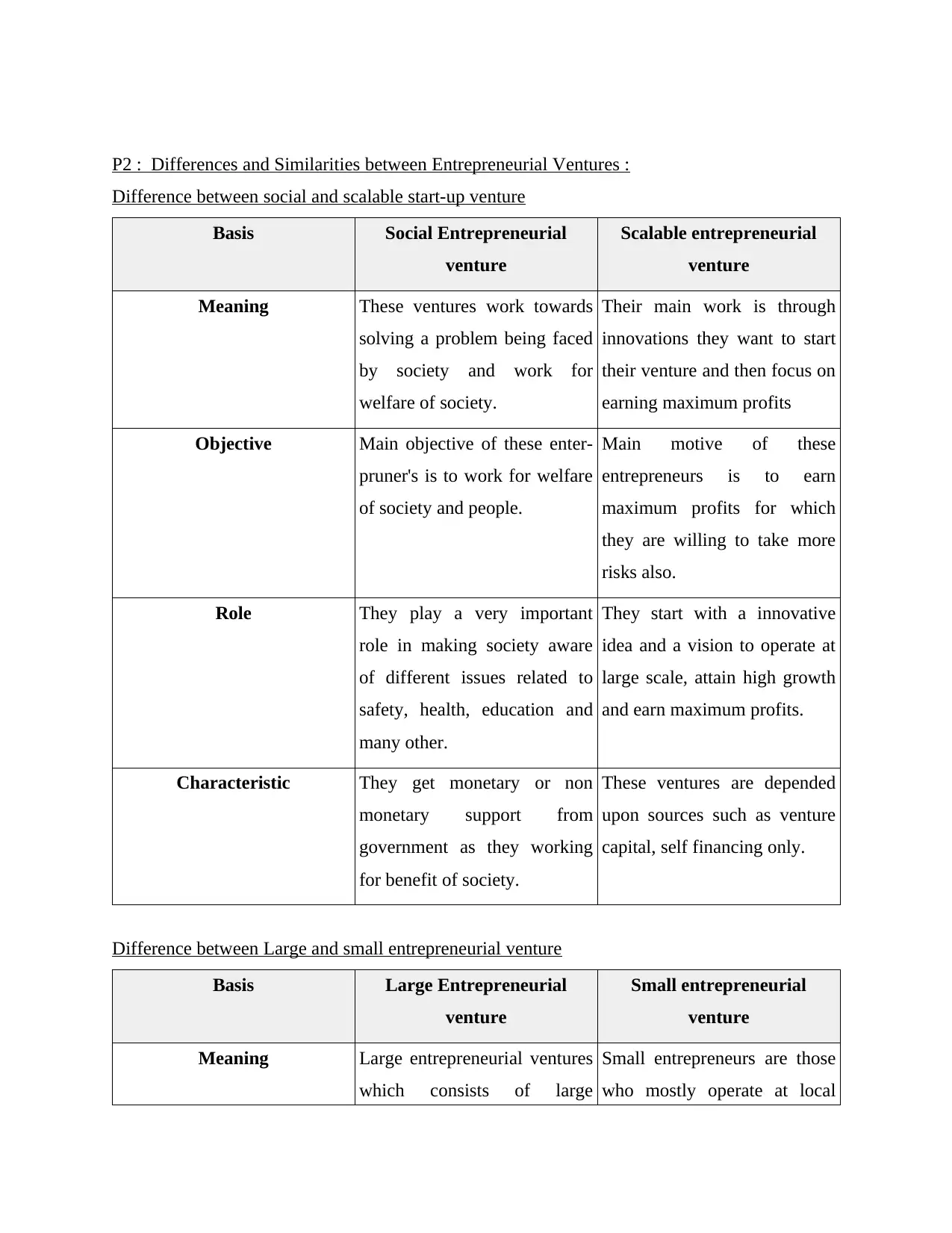
P2 : Differences and Similarities between Entrepreneurial Ventures :
Difference between social and scalable start-up venture
Basis Social Entrepreneurial
venture
Scalable entrepreneurial
venture
Meaning These ventures work towards
solving a problem being faced
by society and work for
welfare of society.
Their main work is through
innovations they want to start
their venture and then focus on
earning maximum profits
Objective Main objective of these enter-
pruner's is to work for welfare
of society and people.
Main motive of these
entrepreneurs is to earn
maximum profits for which
they are willing to take more
risks also.
Role They play a very important
role in making society aware
of different issues related to
safety, health, education and
many other.
They start with a innovative
idea and a vision to operate at
large scale, attain high growth
and earn maximum profits.
Characteristic They get monetary or non
monetary support from
government as they working
for benefit of society.
These ventures are depended
upon sources such as venture
capital, self financing only.
Difference between Large and small entrepreneurial venture
Basis Large Entrepreneurial
venture
Small entrepreneurial
venture
Meaning Large entrepreneurial ventures
which consists of large
Small entrepreneurs are those
who mostly operate at local
Difference between social and scalable start-up venture
Basis Social Entrepreneurial
venture
Scalable entrepreneurial
venture
Meaning These ventures work towards
solving a problem being faced
by society and work for
welfare of society.
Their main work is through
innovations they want to start
their venture and then focus on
earning maximum profits
Objective Main objective of these enter-
pruner's is to work for welfare
of society and people.
Main motive of these
entrepreneurs is to earn
maximum profits for which
they are willing to take more
risks also.
Role They play a very important
role in making society aware
of different issues related to
safety, health, education and
many other.
They start with a innovative
idea and a vision to operate at
large scale, attain high growth
and earn maximum profits.
Characteristic They get monetary or non
monetary support from
government as they working
for benefit of society.
These ventures are depended
upon sources such as venture
capital, self financing only.
Difference between Large and small entrepreneurial venture
Basis Large Entrepreneurial
venture
Small entrepreneurial
venture
Meaning Large entrepreneurial ventures
which consists of large
Small entrepreneurs are those
who mostly operate at local
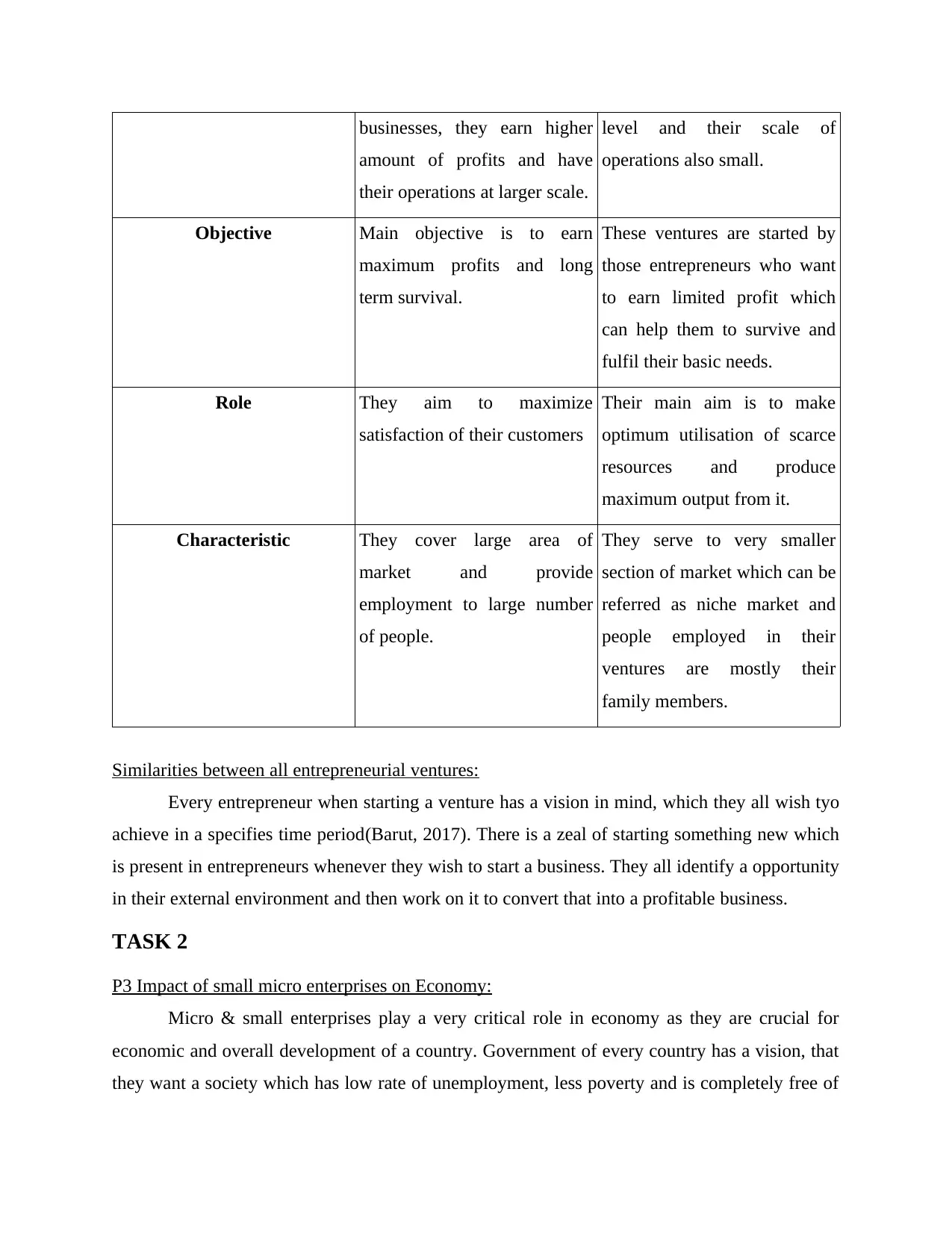
businesses, they earn higher
amount of profits and have
their operations at larger scale.
level and their scale of
operations also small.
Objective Main objective is to earn
maximum profits and long
term survival.
These ventures are started by
those entrepreneurs who want
to earn limited profit which
can help them to survive and
fulfil their basic needs.
Role They aim to maximize
satisfaction of their customers
Their main aim is to make
optimum utilisation of scarce
resources and produce
maximum output from it.
Characteristic They cover large area of
market and provide
employment to large number
of people.
They serve to very smaller
section of market which can be
referred as niche market and
people employed in their
ventures are mostly their
family members.
Similarities between all entrepreneurial ventures:
Every entrepreneur when starting a venture has a vision in mind, which they all wish tyo
achieve in a specifies time period(Barut, 2017). There is a zeal of starting something new which
is present in entrepreneurs whenever they wish to start a business. They all identify a opportunity
in their external environment and then work on it to convert that into a profitable business.
TASK 2
P3 Impact of small micro enterprises on Economy:
Micro & small enterprises play a very critical role in economy as they are crucial for
economic and overall development of a country. Government of every country has a vision, that
they want a society which has low rate of unemployment, less poverty and is completely free of
amount of profits and have
their operations at larger scale.
level and their scale of
operations also small.
Objective Main objective is to earn
maximum profits and long
term survival.
These ventures are started by
those entrepreneurs who want
to earn limited profit which
can help them to survive and
fulfil their basic needs.
Role They aim to maximize
satisfaction of their customers
Their main aim is to make
optimum utilisation of scarce
resources and produce
maximum output from it.
Characteristic They cover large area of
market and provide
employment to large number
of people.
They serve to very smaller
section of market which can be
referred as niche market and
people employed in their
ventures are mostly their
family members.
Similarities between all entrepreneurial ventures:
Every entrepreneur when starting a venture has a vision in mind, which they all wish tyo
achieve in a specifies time period(Barut, 2017). There is a zeal of starting something new which
is present in entrepreneurs whenever they wish to start a business. They all identify a opportunity
in their external environment and then work on it to convert that into a profitable business.
TASK 2
P3 Impact of small micro enterprises on Economy:
Micro & small enterprises play a very critical role in economy as they are crucial for
economic and overall development of a country. Government of every country has a vision, that
they want a society which has low rate of unemployment, less poverty and is completely free of
⊘ This is a preview!⊘
Do you want full access?
Subscribe today to unlock all pages.

Trusted by 1+ million students worldwide
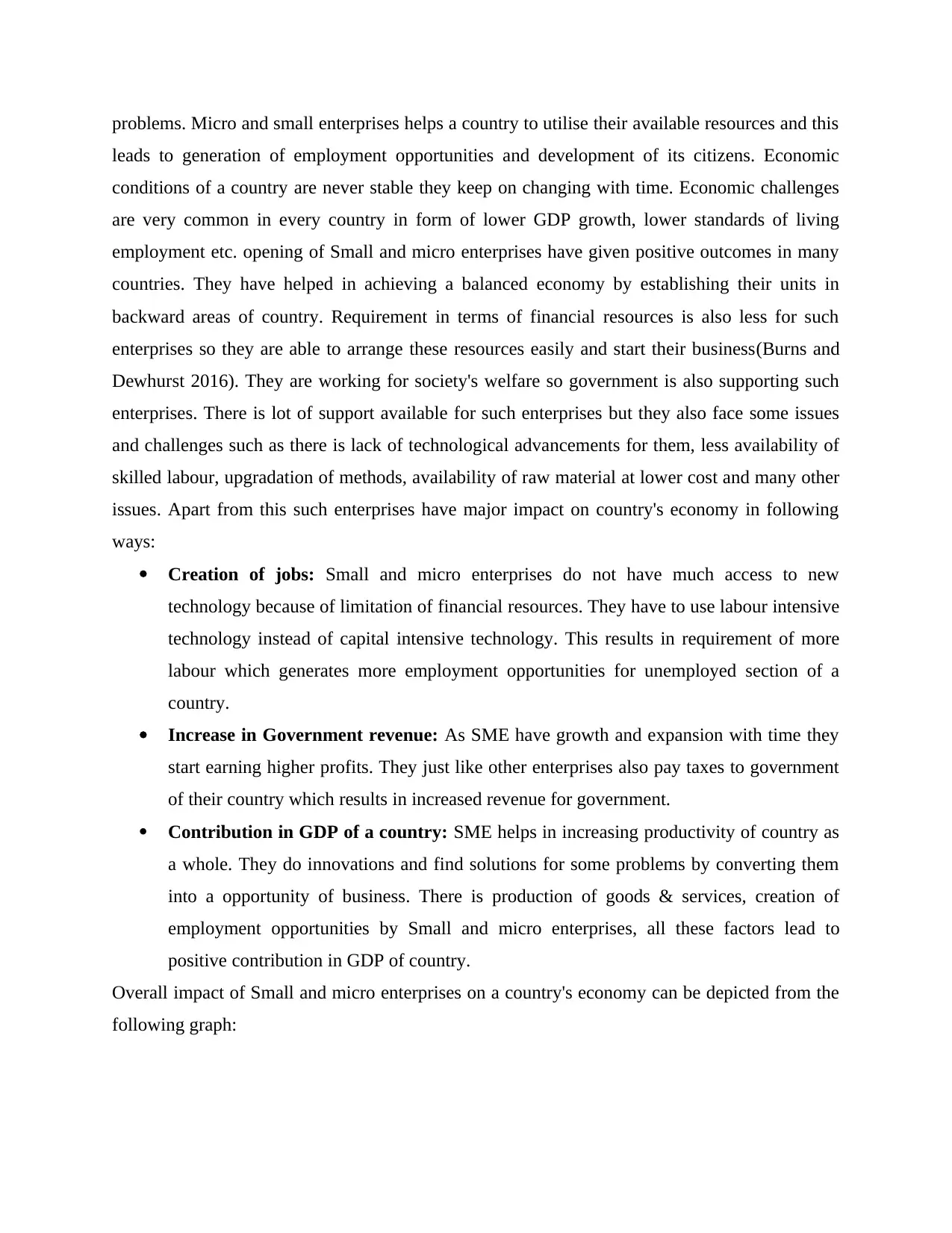
problems. Micro and small enterprises helps a country to utilise their available resources and this
leads to generation of employment opportunities and development of its citizens. Economic
conditions of a country are never stable they keep on changing with time. Economic challenges
are very common in every country in form of lower GDP growth, lower standards of living
employment etc. opening of Small and micro enterprises have given positive outcomes in many
countries. They have helped in achieving a balanced economy by establishing their units in
backward areas of country. Requirement in terms of financial resources is also less for such
enterprises so they are able to arrange these resources easily and start their business(Burns and
Dewhurst 2016). They are working for society's welfare so government is also supporting such
enterprises. There is lot of support available for such enterprises but they also face some issues
and challenges such as there is lack of technological advancements for them, less availability of
skilled labour, upgradation of methods, availability of raw material at lower cost and many other
issues. Apart from this such enterprises have major impact on country's economy in following
ways:
Creation of jobs: Small and micro enterprises do not have much access to new
technology because of limitation of financial resources. They have to use labour intensive
technology instead of capital intensive technology. This results in requirement of more
labour which generates more employment opportunities for unemployed section of a
country.
Increase in Government revenue: As SME have growth and expansion with time they
start earning higher profits. They just like other enterprises also pay taxes to government
of their country which results in increased revenue for government.
Contribution in GDP of a country: SME helps in increasing productivity of country as
a whole. They do innovations and find solutions for some problems by converting them
into a opportunity of business. There is production of goods & services, creation of
employment opportunities by Small and micro enterprises, all these factors lead to
positive contribution in GDP of country.
Overall impact of Small and micro enterprises on a country's economy can be depicted from the
following graph:
leads to generation of employment opportunities and development of its citizens. Economic
conditions of a country are never stable they keep on changing with time. Economic challenges
are very common in every country in form of lower GDP growth, lower standards of living
employment etc. opening of Small and micro enterprises have given positive outcomes in many
countries. They have helped in achieving a balanced economy by establishing their units in
backward areas of country. Requirement in terms of financial resources is also less for such
enterprises so they are able to arrange these resources easily and start their business(Burns and
Dewhurst 2016). They are working for society's welfare so government is also supporting such
enterprises. There is lot of support available for such enterprises but they also face some issues
and challenges such as there is lack of technological advancements for them, less availability of
skilled labour, upgradation of methods, availability of raw material at lower cost and many other
issues. Apart from this such enterprises have major impact on country's economy in following
ways:
Creation of jobs: Small and micro enterprises do not have much access to new
technology because of limitation of financial resources. They have to use labour intensive
technology instead of capital intensive technology. This results in requirement of more
labour which generates more employment opportunities for unemployed section of a
country.
Increase in Government revenue: As SME have growth and expansion with time they
start earning higher profits. They just like other enterprises also pay taxes to government
of their country which results in increased revenue for government.
Contribution in GDP of a country: SME helps in increasing productivity of country as
a whole. They do innovations and find solutions for some problems by converting them
into a opportunity of business. There is production of goods & services, creation of
employment opportunities by Small and micro enterprises, all these factors lead to
positive contribution in GDP of country.
Overall impact of Small and micro enterprises on a country's economy can be depicted from the
following graph:
Paraphrase This Document
Need a fresh take? Get an instant paraphrase of this document with our AI Paraphraser
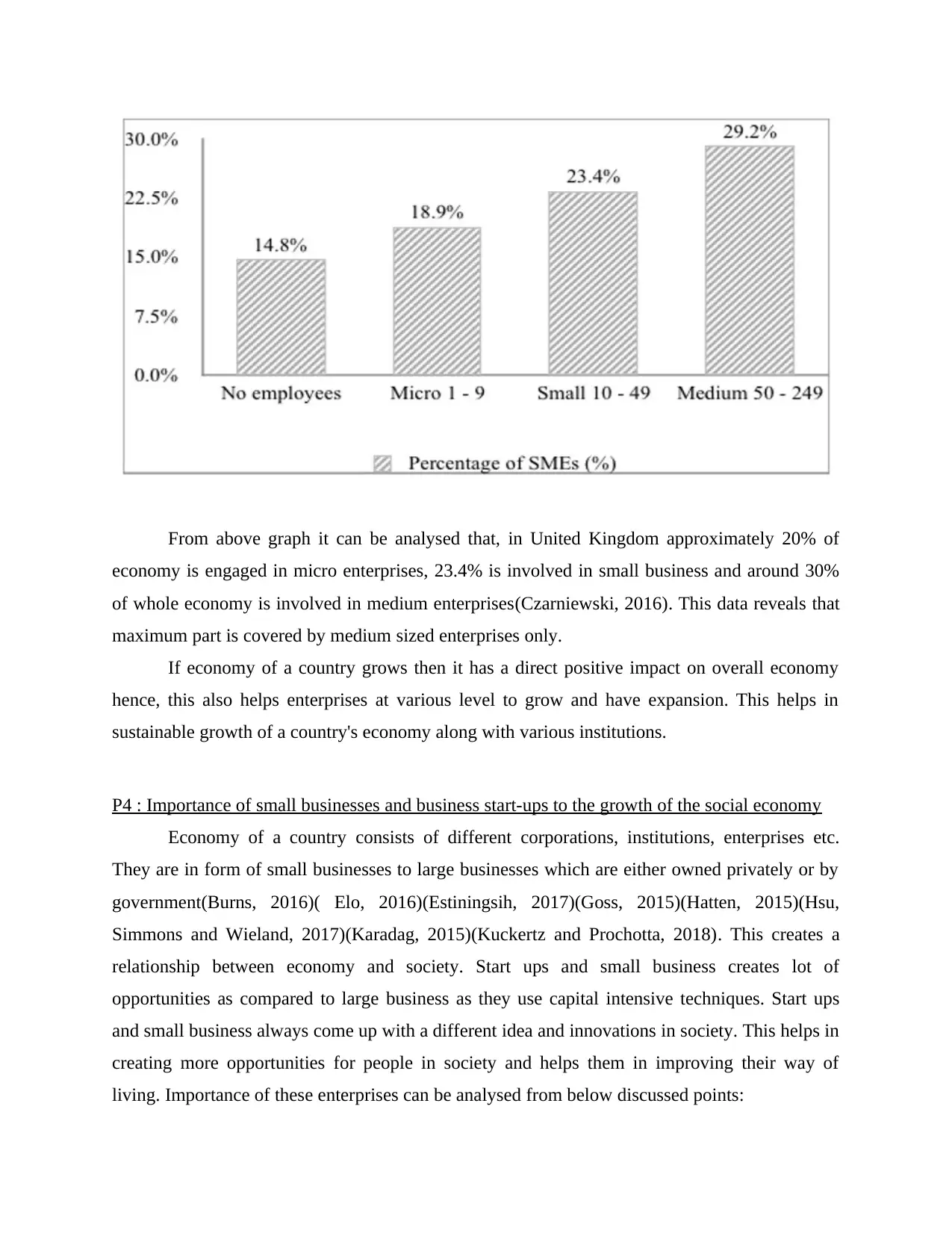
From above graph it can be analysed that, in United Kingdom approximately 20% of
economy is engaged in micro enterprises, 23.4% is involved in small business and around 30%
of whole economy is involved in medium enterprises(Czarniewski, 2016). This data reveals that
maximum part is covered by medium sized enterprises only.
If economy of a country grows then it has a direct positive impact on overall economy
hence, this also helps enterprises at various level to grow and have expansion. This helps in
sustainable growth of a country's economy along with various institutions.
P4 : Importance of small businesses and business start-ups to the growth of the social economy
Economy of a country consists of different corporations, institutions, enterprises etc.
They are in form of small businesses to large businesses which are either owned privately or by
government(Burns, 2016)( Elo, 2016)(Estiningsih, 2017)(Goss, 2015)(Hatten, 2015)(Hsu,
Simmons and Wieland, 2017)(Karadag, 2015)(Kuckertz and Prochotta, 2018). This creates a
relationship between economy and society. Start ups and small business creates lot of
opportunities as compared to large business as they use capital intensive techniques. Start ups
and small business always come up with a different idea and innovations in society. This helps in
creating more opportunities for people in society and helps them in improving their way of
living. Importance of these enterprises can be analysed from below discussed points:
economy is engaged in micro enterprises, 23.4% is involved in small business and around 30%
of whole economy is involved in medium enterprises(Czarniewski, 2016). This data reveals that
maximum part is covered by medium sized enterprises only.
If economy of a country grows then it has a direct positive impact on overall economy
hence, this also helps enterprises at various level to grow and have expansion. This helps in
sustainable growth of a country's economy along with various institutions.
P4 : Importance of small businesses and business start-ups to the growth of the social economy
Economy of a country consists of different corporations, institutions, enterprises etc.
They are in form of small businesses to large businesses which are either owned privately or by
government(Burns, 2016)( Elo, 2016)(Estiningsih, 2017)(Goss, 2015)(Hatten, 2015)(Hsu,
Simmons and Wieland, 2017)(Karadag, 2015)(Kuckertz and Prochotta, 2018). This creates a
relationship between economy and society. Start ups and small business creates lot of
opportunities as compared to large business as they use capital intensive techniques. Start ups
and small business always come up with a different idea and innovations in society. This helps in
creating more opportunities for people in society and helps them in improving their way of
living. Importance of these enterprises can be analysed from below discussed points:
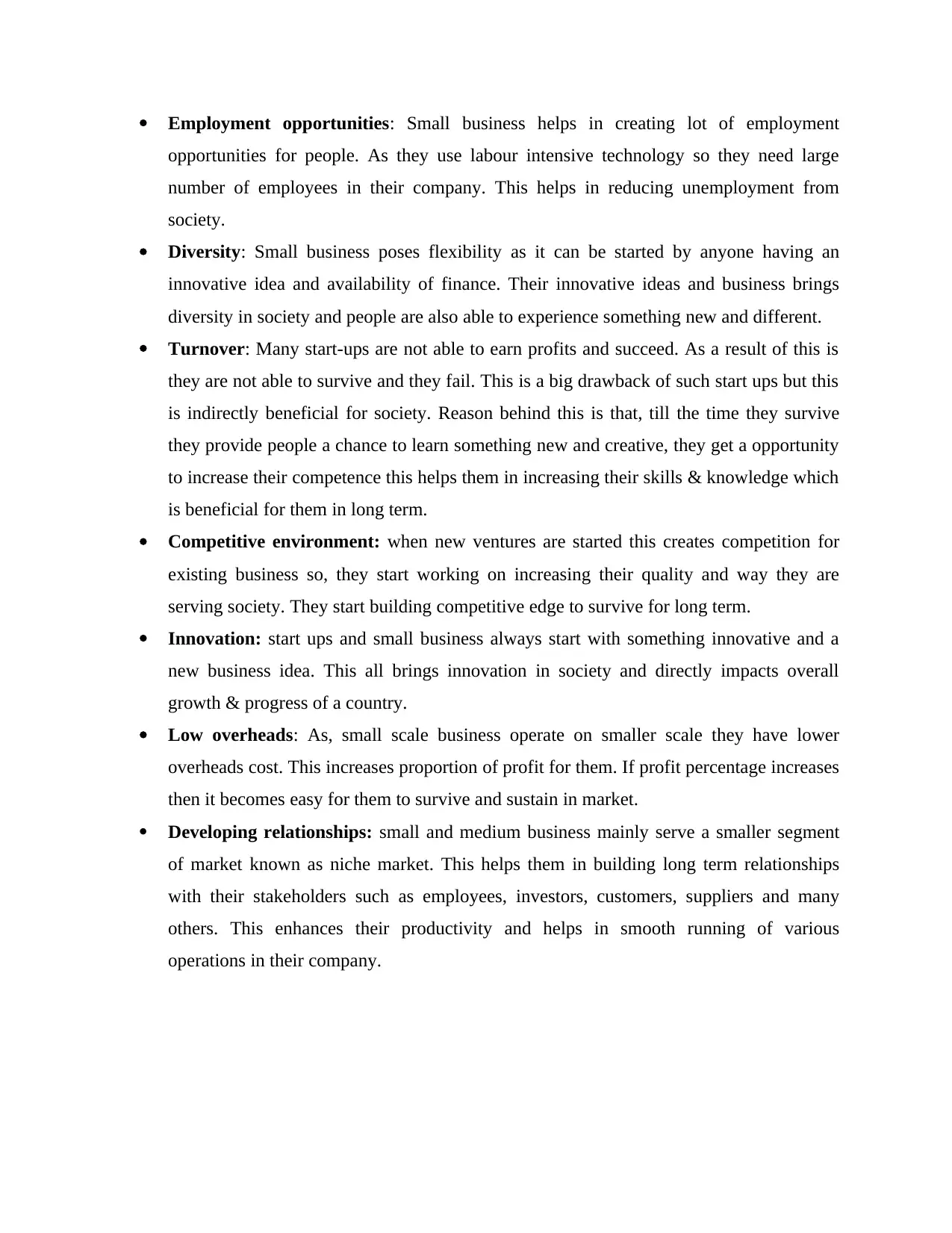
Employment opportunities: Small business helps in creating lot of employment
opportunities for people. As they use labour intensive technology so they need large
number of employees in their company. This helps in reducing unemployment from
society.
Diversity: Small business poses flexibility as it can be started by anyone having an
innovative idea and availability of finance. Their innovative ideas and business brings
diversity in society and people are also able to experience something new and different.
Turnover: Many start-ups are not able to earn profits and succeed. As a result of this is
they are not able to survive and they fail. This is a big drawback of such start ups but this
is indirectly beneficial for society. Reason behind this is that, till the time they survive
they provide people a chance to learn something new and creative, they get a opportunity
to increase their competence this helps them in increasing their skills & knowledge which
is beneficial for them in long term.
Competitive environment: when new ventures are started this creates competition for
existing business so, they start working on increasing their quality and way they are
serving society. They start building competitive edge to survive for long term.
Innovation: start ups and small business always start with something innovative and a
new business idea. This all brings innovation in society and directly impacts overall
growth & progress of a country.
Low overheads: As, small scale business operate on smaller scale they have lower
overheads cost. This increases proportion of profit for them. If profit percentage increases
then it becomes easy for them to survive and sustain in market.
Developing relationships: small and medium business mainly serve a smaller segment
of market known as niche market. This helps them in building long term relationships
with their stakeholders such as employees, investors, customers, suppliers and many
others. This enhances their productivity and helps in smooth running of various
operations in their company.
opportunities for people. As they use labour intensive technology so they need large
number of employees in their company. This helps in reducing unemployment from
society.
Diversity: Small business poses flexibility as it can be started by anyone having an
innovative idea and availability of finance. Their innovative ideas and business brings
diversity in society and people are also able to experience something new and different.
Turnover: Many start-ups are not able to earn profits and succeed. As a result of this is
they are not able to survive and they fail. This is a big drawback of such start ups but this
is indirectly beneficial for society. Reason behind this is that, till the time they survive
they provide people a chance to learn something new and creative, they get a opportunity
to increase their competence this helps them in increasing their skills & knowledge which
is beneficial for them in long term.
Competitive environment: when new ventures are started this creates competition for
existing business so, they start working on increasing their quality and way they are
serving society. They start building competitive edge to survive for long term.
Innovation: start ups and small business always start with something innovative and a
new business idea. This all brings innovation in society and directly impacts overall
growth & progress of a country.
Low overheads: As, small scale business operate on smaller scale they have lower
overheads cost. This increases proportion of profit for them. If profit percentage increases
then it becomes easy for them to survive and sustain in market.
Developing relationships: small and medium business mainly serve a smaller segment
of market known as niche market. This helps them in building long term relationships
with their stakeholders such as employees, investors, customers, suppliers and many
others. This enhances their productivity and helps in smooth running of various
operations in their company.
⊘ This is a preview!⊘
Do you want full access?
Subscribe today to unlock all pages.

Trusted by 1+ million students worldwide
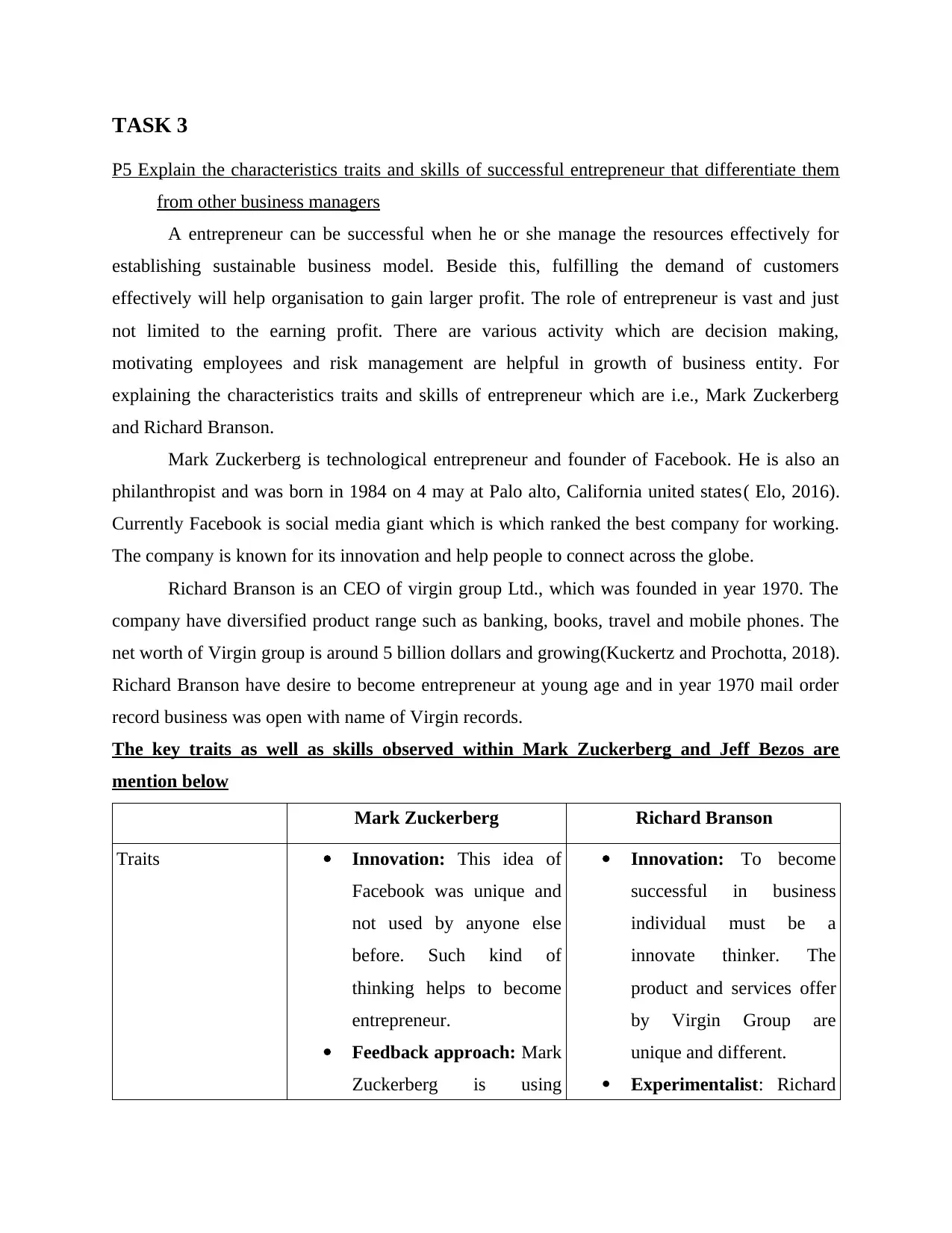
TASK 3
P5 Explain the characteristics traits and skills of successful entrepreneur that differentiate them
from other business managers
A entrepreneur can be successful when he or she manage the resources effectively for
establishing sustainable business model. Beside this, fulfilling the demand of customers
effectively will help organisation to gain larger profit. The role of entrepreneur is vast and just
not limited to the earning profit. There are various activity which are decision making,
motivating employees and risk management are helpful in growth of business entity. For
explaining the characteristics traits and skills of entrepreneur which are i.e., Mark Zuckerberg
and Richard Branson.
Mark Zuckerberg is technological entrepreneur and founder of Facebook. He is also an
philanthropist and was born in 1984 on 4 may at Palo alto, California united states( Elo, 2016).
Currently Facebook is social media giant which is which ranked the best company for working.
The company is known for its innovation and help people to connect across the globe.
Richard Branson is an CEO of virgin group Ltd., which was founded in year 1970. The
company have diversified product range such as banking, books, travel and mobile phones. The
net worth of Virgin group is around 5 billion dollars and growing(Kuckertz and Prochotta, 2018).
Richard Branson have desire to become entrepreneur at young age and in year 1970 mail order
record business was open with name of Virgin records.
The key traits as well as skills observed within Mark Zuckerberg and Jeff Bezos are
mention below
Mark Zuckerberg Richard Branson
Traits Innovation: This idea of
Facebook was unique and
not used by anyone else
before. Such kind of
thinking helps to become
entrepreneur.
Feedback approach: Mark
Zuckerberg is using
Innovation: To become
successful in business
individual must be a
innovate thinker. The
product and services offer
by Virgin Group are
unique and different.
Experimentalist: Richard
P5 Explain the characteristics traits and skills of successful entrepreneur that differentiate them
from other business managers
A entrepreneur can be successful when he or she manage the resources effectively for
establishing sustainable business model. Beside this, fulfilling the demand of customers
effectively will help organisation to gain larger profit. The role of entrepreneur is vast and just
not limited to the earning profit. There are various activity which are decision making,
motivating employees and risk management are helpful in growth of business entity. For
explaining the characteristics traits and skills of entrepreneur which are i.e., Mark Zuckerberg
and Richard Branson.
Mark Zuckerberg is technological entrepreneur and founder of Facebook. He is also an
philanthropist and was born in 1984 on 4 may at Palo alto, California united states( Elo, 2016).
Currently Facebook is social media giant which is which ranked the best company for working.
The company is known for its innovation and help people to connect across the globe.
Richard Branson is an CEO of virgin group Ltd., which was founded in year 1970. The
company have diversified product range such as banking, books, travel and mobile phones. The
net worth of Virgin group is around 5 billion dollars and growing(Kuckertz and Prochotta, 2018).
Richard Branson have desire to become entrepreneur at young age and in year 1970 mail order
record business was open with name of Virgin records.
The key traits as well as skills observed within Mark Zuckerberg and Jeff Bezos are
mention below
Mark Zuckerberg Richard Branson
Traits Innovation: This idea of
Facebook was unique and
not used by anyone else
before. Such kind of
thinking helps to become
entrepreneur.
Feedback approach: Mark
Zuckerberg is using
Innovation: To become
successful in business
individual must be a
innovate thinker. The
product and services offer
by Virgin Group are
unique and different.
Experimentalist: Richard
Paraphrase This Document
Need a fresh take? Get an instant paraphrase of this document with our AI Paraphraser
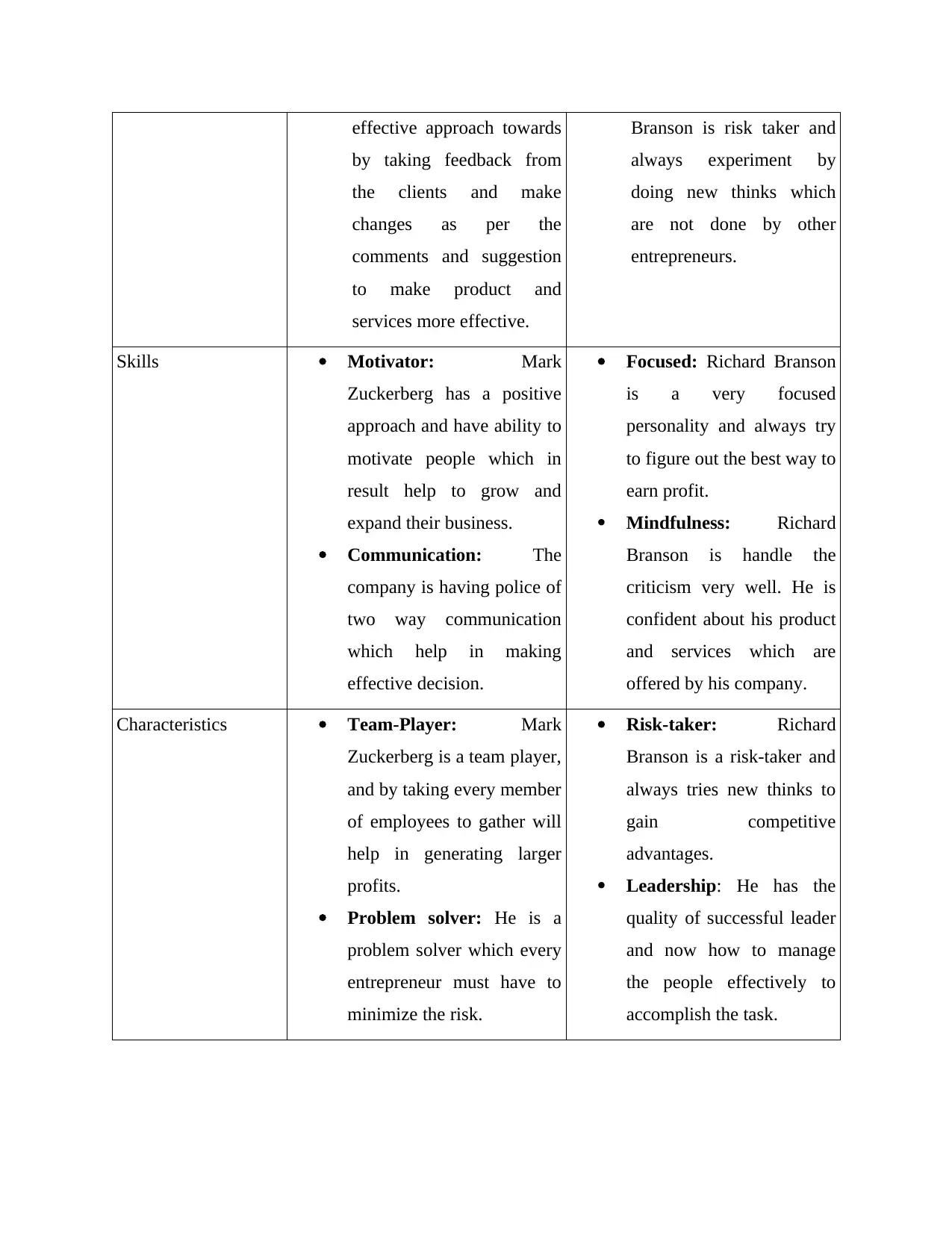
effective approach towards
by taking feedback from
the clients and make
changes as per the
comments and suggestion
to make product and
services more effective.
Branson is risk taker and
always experiment by
doing new thinks which
are not done by other
entrepreneurs.
Skills Motivator: Mark
Zuckerberg has a positive
approach and have ability to
motivate people which in
result help to grow and
expand their business.
Communication: The
company is having police of
two way communication
which help in making
effective decision.
Focused: Richard Branson
is a very focused
personality and always try
to figure out the best way to
earn profit.
Mindfulness: Richard
Branson is handle the
criticism very well. He is
confident about his product
and services which are
offered by his company.
Characteristics Team-Player: Mark
Zuckerberg is a team player,
and by taking every member
of employees to gather will
help in generating larger
profits.
Problem solver: He is a
problem solver which every
entrepreneur must have to
minimize the risk.
Risk-taker: Richard
Branson is a risk-taker and
always tries new thinks to
gain competitive
advantages.
Leadership: He has the
quality of successful leader
and now how to manage
the people effectively to
accomplish the task.
by taking feedback from
the clients and make
changes as per the
comments and suggestion
to make product and
services more effective.
Branson is risk taker and
always experiment by
doing new thinks which
are not done by other
entrepreneurs.
Skills Motivator: Mark
Zuckerberg has a positive
approach and have ability to
motivate people which in
result help to grow and
expand their business.
Communication: The
company is having police of
two way communication
which help in making
effective decision.
Focused: Richard Branson
is a very focused
personality and always try
to figure out the best way to
earn profit.
Mindfulness: Richard
Branson is handle the
criticism very well. He is
confident about his product
and services which are
offered by his company.
Characteristics Team-Player: Mark
Zuckerberg is a team player,
and by taking every member
of employees to gather will
help in generating larger
profits.
Problem solver: He is a
problem solver which every
entrepreneur must have to
minimize the risk.
Risk-taker: Richard
Branson is a risk-taker and
always tries new thinks to
gain competitive
advantages.
Leadership: He has the
quality of successful leader
and now how to manage
the people effectively to
accomplish the task.
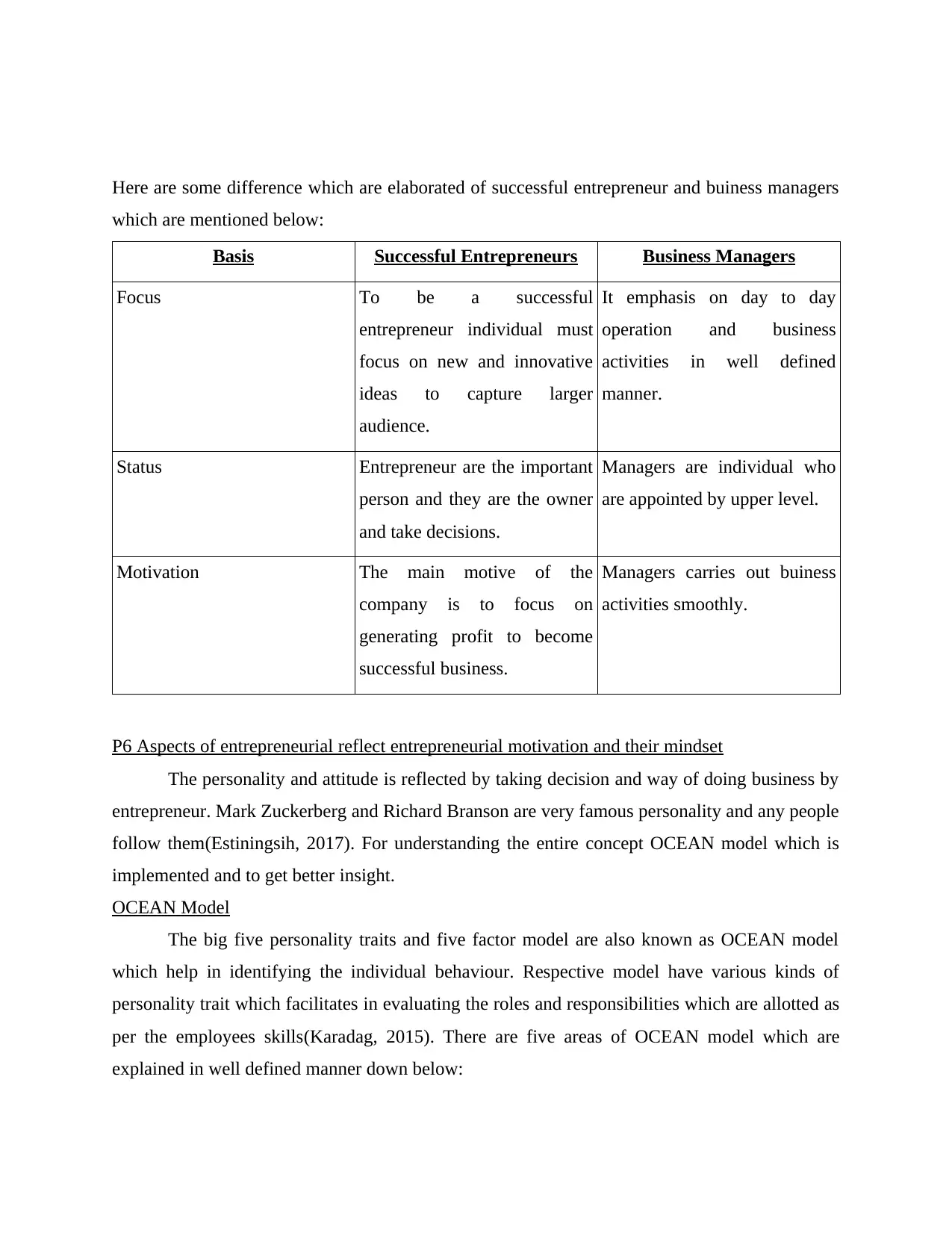
Here are some difference which are elaborated of successful entrepreneur and buiness managers
which are mentioned below:
Basis Successful Entrepreneurs Business Managers
Focus To be a successful
entrepreneur individual must
focus on new and innovative
ideas to capture larger
audience.
It emphasis on day to day
operation and business
activities in well defined
manner.
Status Entrepreneur are the important
person and they are the owner
and take decisions.
Managers are individual who
are appointed by upper level.
Motivation The main motive of the
company is to focus on
generating profit to become
successful business.
Managers carries out buiness
activities smoothly.
P6 Aspects of entrepreneurial reflect entrepreneurial motivation and their mindset
The personality and attitude is reflected by taking decision and way of doing business by
entrepreneur. Mark Zuckerberg and Richard Branson are very famous personality and any people
follow them(Estiningsih, 2017). For understanding the entire concept OCEAN model which is
implemented and to get better insight.
OCEAN Model
The big five personality traits and five factor model are also known as OCEAN model
which help in identifying the individual behaviour. Respective model have various kinds of
personality trait which facilitates in evaluating the roles and responsibilities which are allotted as
per the employees skills(Karadag, 2015). There are five areas of OCEAN model which are
explained in well defined manner down below:
which are mentioned below:
Basis Successful Entrepreneurs Business Managers
Focus To be a successful
entrepreneur individual must
focus on new and innovative
ideas to capture larger
audience.
It emphasis on day to day
operation and business
activities in well defined
manner.
Status Entrepreneur are the important
person and they are the owner
and take decisions.
Managers are individual who
are appointed by upper level.
Motivation The main motive of the
company is to focus on
generating profit to become
successful business.
Managers carries out buiness
activities smoothly.
P6 Aspects of entrepreneurial reflect entrepreneurial motivation and their mindset
The personality and attitude is reflected by taking decision and way of doing business by
entrepreneur. Mark Zuckerberg and Richard Branson are very famous personality and any people
follow them(Estiningsih, 2017). For understanding the entire concept OCEAN model which is
implemented and to get better insight.
OCEAN Model
The big five personality traits and five factor model are also known as OCEAN model
which help in identifying the individual behaviour. Respective model have various kinds of
personality trait which facilitates in evaluating the roles and responsibilities which are allotted as
per the employees skills(Karadag, 2015). There are five areas of OCEAN model which are
explained in well defined manner down below:
⊘ This is a preview!⊘
Do you want full access?
Subscribe today to unlock all pages.

Trusted by 1+ million students worldwide
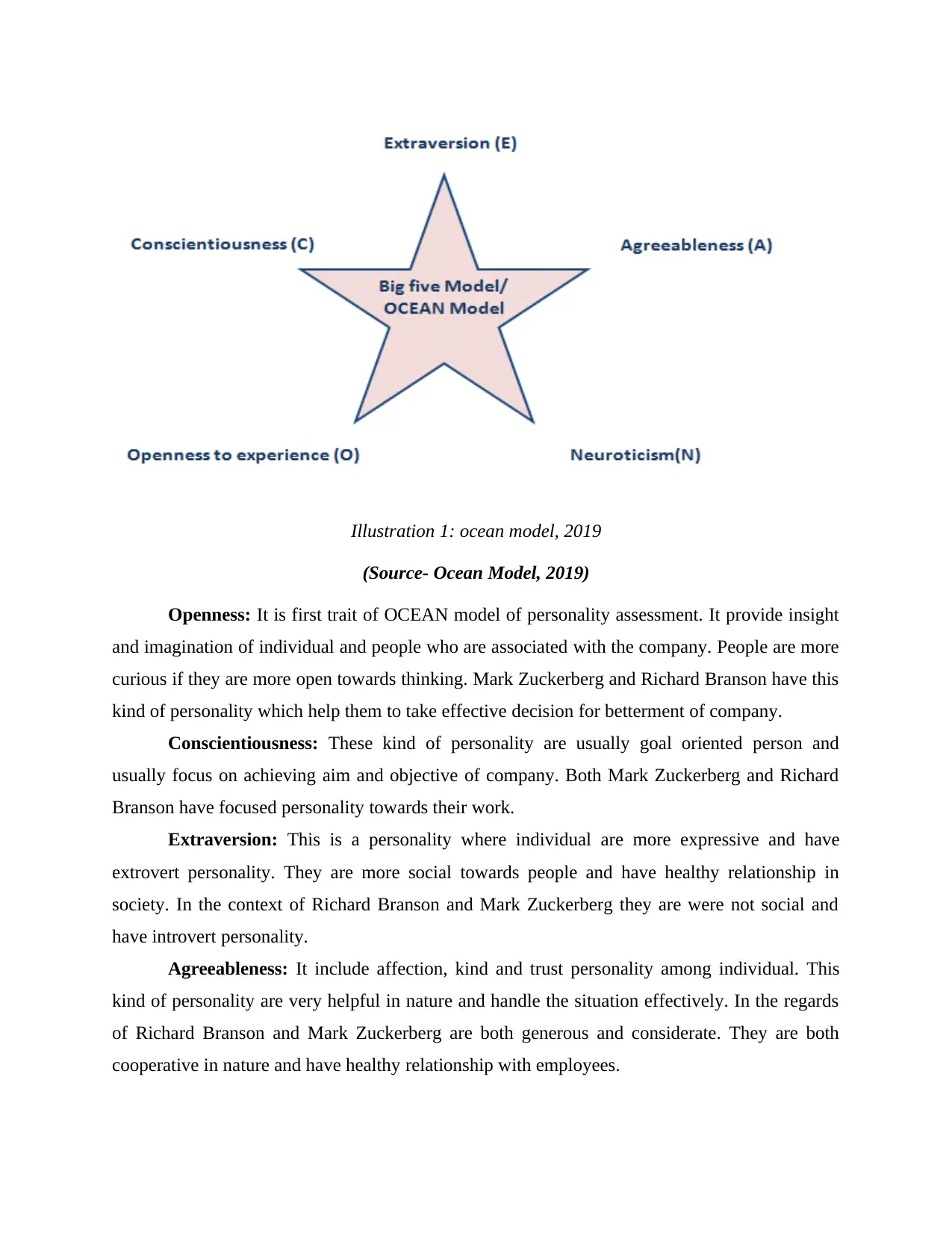
Illustration 1: ocean model, 2019
(Source- Ocean Model, 2019)
Openness: It is first trait of OCEAN model of personality assessment. It provide insight
and imagination of individual and people who are associated with the company. People are more
curious if they are more open towards thinking. Mark Zuckerberg and Richard Branson have this
kind of personality which help them to take effective decision for betterment of company.
Conscientiousness: These kind of personality are usually goal oriented person and
usually focus on achieving aim and objective of company. Both Mark Zuckerberg and Richard
Branson have focused personality towards their work.
Extraversion: This is a personality where individual are more expressive and have
extrovert personality. They are more social towards people and have healthy relationship in
society. In the context of Richard Branson and Mark Zuckerberg they are were not social and
have introvert personality.
Agreeableness: It include affection, kind and trust personality among individual. This
kind of personality are very helpful in nature and handle the situation effectively. In the regards
of Richard Branson and Mark Zuckerberg are both generous and considerate. They are both
cooperative in nature and have healthy relationship with employees.
(Source- Ocean Model, 2019)
Openness: It is first trait of OCEAN model of personality assessment. It provide insight
and imagination of individual and people who are associated with the company. People are more
curious if they are more open towards thinking. Mark Zuckerberg and Richard Branson have this
kind of personality which help them to take effective decision for betterment of company.
Conscientiousness: These kind of personality are usually goal oriented person and
usually focus on achieving aim and objective of company. Both Mark Zuckerberg and Richard
Branson have focused personality towards their work.
Extraversion: This is a personality where individual are more expressive and have
extrovert personality. They are more social towards people and have healthy relationship in
society. In the context of Richard Branson and Mark Zuckerberg they are were not social and
have introvert personality.
Agreeableness: It include affection, kind and trust personality among individual. This
kind of personality are very helpful in nature and handle the situation effectively. In the regards
of Richard Branson and Mark Zuckerberg are both generous and considerate. They are both
cooperative in nature and have healthy relationship with employees.
Paraphrase This Document
Need a fresh take? Get an instant paraphrase of this document with our AI Paraphraser
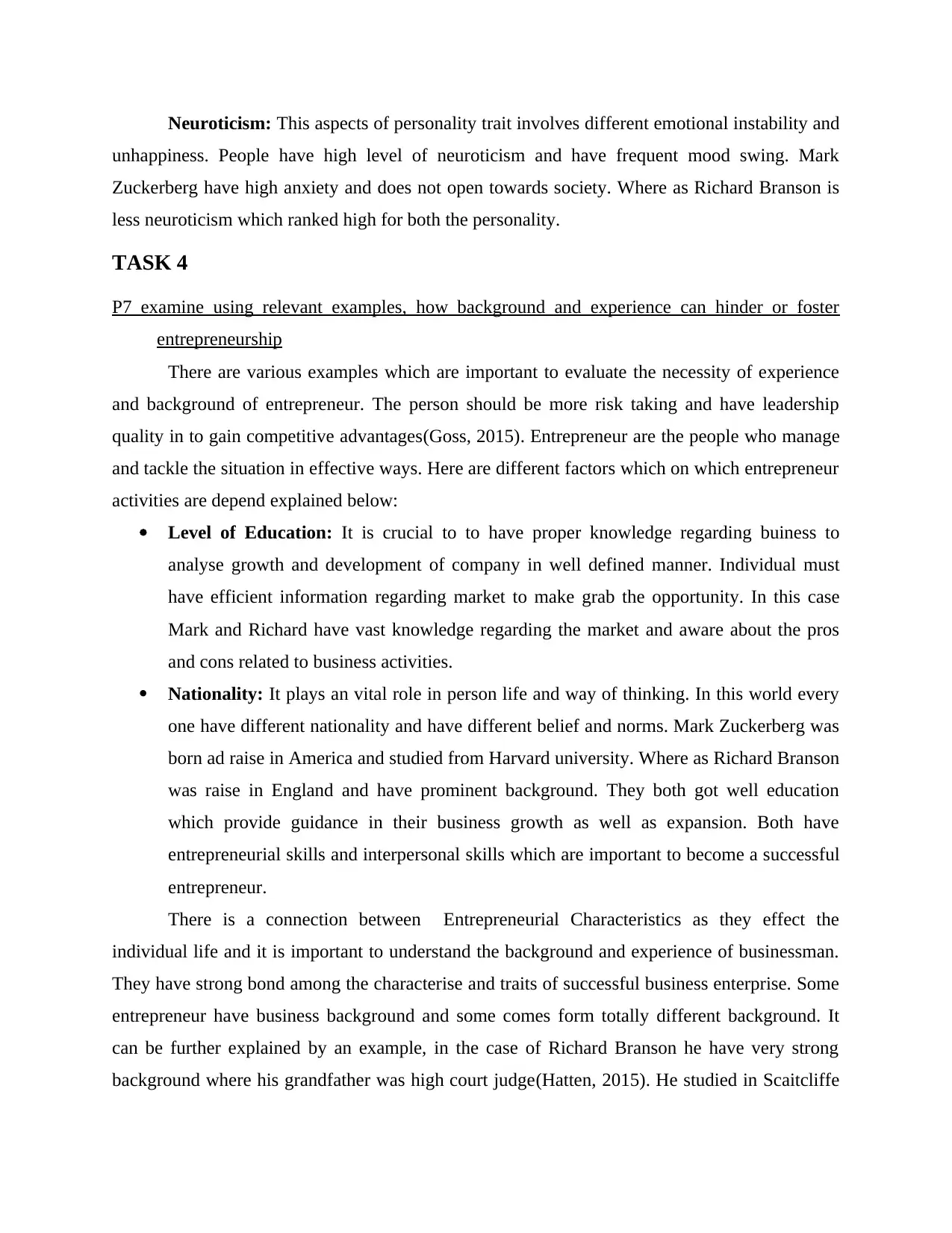
Neuroticism: This aspects of personality trait involves different emotional instability and
unhappiness. People have high level of neuroticism and have frequent mood swing. Mark
Zuckerberg have high anxiety and does not open towards society. Where as Richard Branson is
less neuroticism which ranked high for both the personality.
TASK 4
P7 examine using relevant examples, how background and experience can hinder or foster
entrepreneurship
There are various examples which are important to evaluate the necessity of experience
and background of entrepreneur. The person should be more risk taking and have leadership
quality in to gain competitive advantages(Goss, 2015). Entrepreneur are the people who manage
and tackle the situation in effective ways. Here are different factors which on which entrepreneur
activities are depend explained below:
Level of Education: It is crucial to to have proper knowledge regarding buiness to
analyse growth and development of company in well defined manner. Individual must
have efficient information regarding market to make grab the opportunity. In this case
Mark and Richard have vast knowledge regarding the market and aware about the pros
and cons related to business activities.
Nationality: It plays an vital role in person life and way of thinking. In this world every
one have different nationality and have different belief and norms. Mark Zuckerberg was
born ad raise in America and studied from Harvard university. Where as Richard Branson
was raise in England and have prominent background. They both got well education
which provide guidance in their business growth as well as expansion. Both have
entrepreneurial skills and interpersonal skills which are important to become a successful
entrepreneur.
There is a connection between Entrepreneurial Characteristics as they effect the
individual life and it is important to understand the background and experience of businessman.
They have strong bond among the characterise and traits of successful business enterprise. Some
entrepreneur have business background and some comes form totally different background. It
can be further explained by an example, in the case of Richard Branson he have very strong
background where his grandfather was high court judge(Hatten, 2015). He studied in Scaitcliffe
unhappiness. People have high level of neuroticism and have frequent mood swing. Mark
Zuckerberg have high anxiety and does not open towards society. Where as Richard Branson is
less neuroticism which ranked high for both the personality.
TASK 4
P7 examine using relevant examples, how background and experience can hinder or foster
entrepreneurship
There are various examples which are important to evaluate the necessity of experience
and background of entrepreneur. The person should be more risk taking and have leadership
quality in to gain competitive advantages(Goss, 2015). Entrepreneur are the people who manage
and tackle the situation in effective ways. Here are different factors which on which entrepreneur
activities are depend explained below:
Level of Education: It is crucial to to have proper knowledge regarding buiness to
analyse growth and development of company in well defined manner. Individual must
have efficient information regarding market to make grab the opportunity. In this case
Mark and Richard have vast knowledge regarding the market and aware about the pros
and cons related to business activities.
Nationality: It plays an vital role in person life and way of thinking. In this world every
one have different nationality and have different belief and norms. Mark Zuckerberg was
born ad raise in America and studied from Harvard university. Where as Richard Branson
was raise in England and have prominent background. They both got well education
which provide guidance in their business growth as well as expansion. Both have
entrepreneurial skills and interpersonal skills which are important to become a successful
entrepreneur.
There is a connection between Entrepreneurial Characteristics as they effect the
individual life and it is important to understand the background and experience of businessman.
They have strong bond among the characterise and traits of successful business enterprise. Some
entrepreneur have business background and some comes form totally different background. It
can be further explained by an example, in the case of Richard Branson he have very strong
background where his grandfather was high court judge(Hatten, 2015). He studied in Scaitcliffe
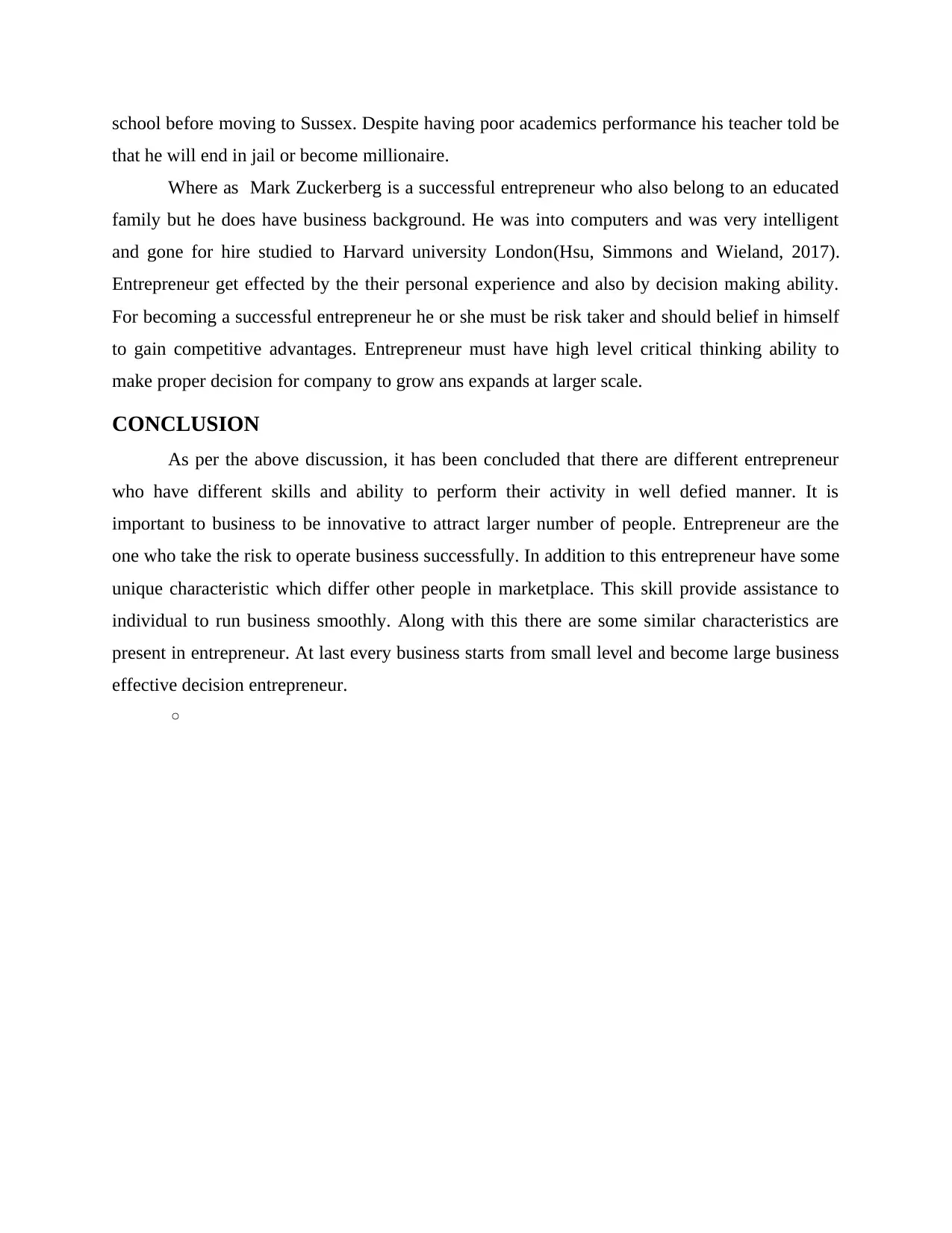
school before moving to Sussex. Despite having poor academics performance his teacher told be
that he will end in jail or become millionaire.
Where as Mark Zuckerberg is a successful entrepreneur who also belong to an educated
family but he does have business background. He was into computers and was very intelligent
and gone for hire studied to Harvard university London(Hsu, Simmons and Wieland, 2017).
Entrepreneur get effected by the their personal experience and also by decision making ability.
For becoming a successful entrepreneur he or she must be risk taker and should belief in himself
to gain competitive advantages. Entrepreneur must have high level critical thinking ability to
make proper decision for company to grow ans expands at larger scale.
CONCLUSION
As per the above discussion, it has been concluded that there are different entrepreneur
who have different skills and ability to perform their activity in well defied manner. It is
important to business to be innovative to attract larger number of people. Entrepreneur are the
one who take the risk to operate business successfully. In addition to this entrepreneur have some
unique characteristic which differ other people in marketplace. This skill provide assistance to
individual to run business smoothly. Along with this there are some similar characteristics are
present in entrepreneur. At last every business starts from small level and become large business
effective decision entrepreneur.
◦
that he will end in jail or become millionaire.
Where as Mark Zuckerberg is a successful entrepreneur who also belong to an educated
family but he does have business background. He was into computers and was very intelligent
and gone for hire studied to Harvard university London(Hsu, Simmons and Wieland, 2017).
Entrepreneur get effected by the their personal experience and also by decision making ability.
For becoming a successful entrepreneur he or she must be risk taker and should belief in himself
to gain competitive advantages. Entrepreneur must have high level critical thinking ability to
make proper decision for company to grow ans expands at larger scale.
CONCLUSION
As per the above discussion, it has been concluded that there are different entrepreneur
who have different skills and ability to perform their activity in well defied manner. It is
important to business to be innovative to attract larger number of people. Entrepreneur are the
one who take the risk to operate business successfully. In addition to this entrepreneur have some
unique characteristic which differ other people in marketplace. This skill provide assistance to
individual to run business smoothly. Along with this there are some similar characteristics are
present in entrepreneur. At last every business starts from small level and become large business
effective decision entrepreneur.
◦
⊘ This is a preview!⊘
Do you want full access?
Subscribe today to unlock all pages.

Trusted by 1+ million students worldwide
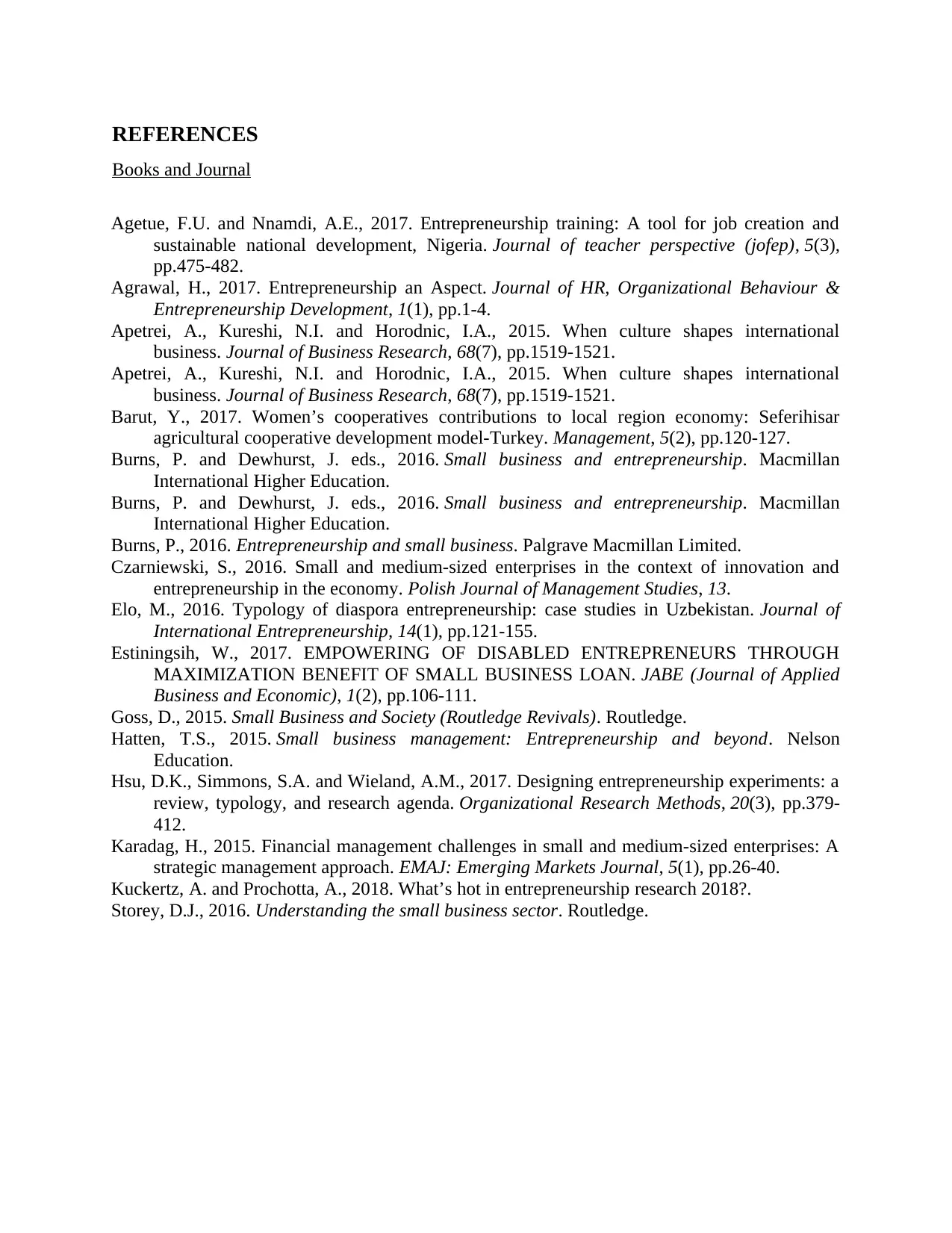
REFERENCES
Books and Journal
Agetue, F.U. and Nnamdi, A.E., 2017. Entrepreneurship training: A tool for job creation and
sustainable national development, Nigeria. Journal of teacher perspective (jofep), 5(3),
pp.475-482.
Agrawal, H., 2017. Entrepreneurship an Aspect. Journal of HR, Organizational Behaviour &
Entrepreneurship Development, 1(1), pp.1-4.
Apetrei, A., Kureshi, N.I. and Horodnic, I.A., 2015. When culture shapes international
business. Journal of Business Research, 68(7), pp.1519-1521.
Apetrei, A., Kureshi, N.I. and Horodnic, I.A., 2015. When culture shapes international
business. Journal of Business Research, 68(7), pp.1519-1521.
Barut, Y., 2017. Women’s cooperatives contributions to local region economy: Seferihisar
agricultural cooperative development model-Turkey. Management, 5(2), pp.120-127.
Burns, P. and Dewhurst, J. eds., 2016. Small business and entrepreneurship. Macmillan
International Higher Education.
Burns, P. and Dewhurst, J. eds., 2016. Small business and entrepreneurship. Macmillan
International Higher Education.
Burns, P., 2016. Entrepreneurship and small business. Palgrave Macmillan Limited.
Czarniewski, S., 2016. Small and medium-sized enterprises in the context of innovation and
entrepreneurship in the economy. Polish Journal of Management Studies, 13.
Elo, M., 2016. Typology of diaspora entrepreneurship: case studies in Uzbekistan. Journal of
International Entrepreneurship, 14(1), pp.121-155.
Estiningsih, W., 2017. EMPOWERING OF DISABLED ENTREPRENEURS THROUGH
MAXIMIZATION BENEFIT OF SMALL BUSINESS LOAN. JABE (Journal of Applied
Business and Economic), 1(2), pp.106-111.
Goss, D., 2015. Small Business and Society (Routledge Revivals). Routledge.
Hatten, T.S., 2015. Small business management: Entrepreneurship and beyond. Nelson
Education.
Hsu, D.K., Simmons, S.A. and Wieland, A.M., 2017. Designing entrepreneurship experiments: a
review, typology, and research agenda. Organizational Research Methods, 20(3), pp.379-
412.
Karadag, H., 2015. Financial management challenges in small and medium-sized enterprises: A
strategic management approach. EMAJ: Emerging Markets Journal, 5(1), pp.26-40.
Kuckertz, A. and Prochotta, A., 2018. What’s hot in entrepreneurship research 2018?.
Storey, D.J., 2016. Understanding the small business sector. Routledge.
Books and Journal
Agetue, F.U. and Nnamdi, A.E., 2017. Entrepreneurship training: A tool for job creation and
sustainable national development, Nigeria. Journal of teacher perspective (jofep), 5(3),
pp.475-482.
Agrawal, H., 2017. Entrepreneurship an Aspect. Journal of HR, Organizational Behaviour &
Entrepreneurship Development, 1(1), pp.1-4.
Apetrei, A., Kureshi, N.I. and Horodnic, I.A., 2015. When culture shapes international
business. Journal of Business Research, 68(7), pp.1519-1521.
Apetrei, A., Kureshi, N.I. and Horodnic, I.A., 2015. When culture shapes international
business. Journal of Business Research, 68(7), pp.1519-1521.
Barut, Y., 2017. Women’s cooperatives contributions to local region economy: Seferihisar
agricultural cooperative development model-Turkey. Management, 5(2), pp.120-127.
Burns, P. and Dewhurst, J. eds., 2016. Small business and entrepreneurship. Macmillan
International Higher Education.
Burns, P. and Dewhurst, J. eds., 2016. Small business and entrepreneurship. Macmillan
International Higher Education.
Burns, P., 2016. Entrepreneurship and small business. Palgrave Macmillan Limited.
Czarniewski, S., 2016. Small and medium-sized enterprises in the context of innovation and
entrepreneurship in the economy. Polish Journal of Management Studies, 13.
Elo, M., 2016. Typology of diaspora entrepreneurship: case studies in Uzbekistan. Journal of
International Entrepreneurship, 14(1), pp.121-155.
Estiningsih, W., 2017. EMPOWERING OF DISABLED ENTREPRENEURS THROUGH
MAXIMIZATION BENEFIT OF SMALL BUSINESS LOAN. JABE (Journal of Applied
Business and Economic), 1(2), pp.106-111.
Goss, D., 2015. Small Business and Society (Routledge Revivals). Routledge.
Hatten, T.S., 2015. Small business management: Entrepreneurship and beyond. Nelson
Education.
Hsu, D.K., Simmons, S.A. and Wieland, A.M., 2017. Designing entrepreneurship experiments: a
review, typology, and research agenda. Organizational Research Methods, 20(3), pp.379-
412.
Karadag, H., 2015. Financial management challenges in small and medium-sized enterprises: A
strategic management approach. EMAJ: Emerging Markets Journal, 5(1), pp.26-40.
Kuckertz, A. and Prochotta, A., 2018. What’s hot in entrepreneurship research 2018?.
Storey, D.J., 2016. Understanding the small business sector. Routledge.
1 out of 16
Related Documents
Your All-in-One AI-Powered Toolkit for Academic Success.
+13062052269
info@desklib.com
Available 24*7 on WhatsApp / Email
![[object Object]](/_next/static/media/star-bottom.7253800d.svg)
Unlock your academic potential
© 2024 | Zucol Services PVT LTD | All rights reserved.





